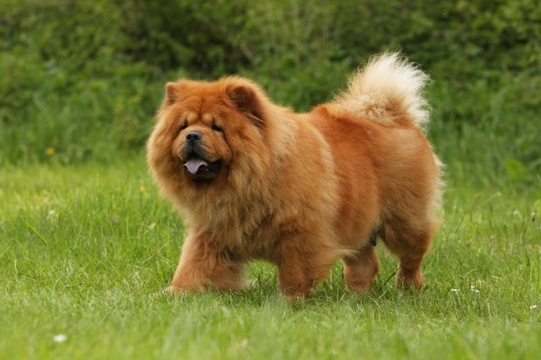
Chow Chow hereditary health and genetic diversity
The Chow Chow is a strong, sturdy dog breed that hails from northern China, and which is most distinctive thanks to its coat, and rather unusual tongue! The breed is often said to resemble the lion, due to its very thick double-layered coat, which is particularly long around the neck, giving it a ruffled appearance similar to that of the male lion.
The breed also has a highly distinctive blue-black coloured tongue, and a highly curled tail that is typical of spitz-type dogs. The breed can be seen in colours including black, blue, fawn, red, cinnamon and cream. The coat should be all one colour, with coats containing two or more colours considered as outside of the preferred breed standard. Dogs of the breed stand between 17-20” tall at the withers, and males can weigh between 55-70lb, with females falling between 45-60lb.
The Chow Chow is classed as a high profile dog breed by the UK Kennel Club, meaning that the breed is subject to careful monitoring for their hereditary diversity and breed-specific health problems. If you are considering buying a Chow Chow dog, it is important to make yourself aware of what this means for your dog in terms of their health and longevity.
In this article, we will look at the hereditary health, genetic diversity and longevity of the breed in more detail. Read on to learn more.
Chow Chow longevity
The average lifespan of the Chow Chow can be rather variable, with the median figure for UK dogs being between 9-15 years, covering the range from a relatively short lifespan across the board for dogs of a similar size, to the top end of the scale.
A large part of this variance can be attributed to the propensity for hereditary health problems within certain breed lines, and breed lines that are free or mainly free of such problems will tend to be much longer lived than others.
Genetic diversity and breed-specific health tests for the Chow Chow
The coefficient of inbreeding statistic for the Chow Chow is 6.6%, which is only a touch higher than the ideal of 6.25% or lower. This means that there is a relatively high degree of genetic diversity across the breed as a whole, and that the breed is not subject to a particularly high degree of inbreeding.
Health testing prior to breeding is recommended by The Kennel Club and the British Veterinary Association, to identify a predisposition to certain hereditary health problems:
- Elbow dysplasia, with the ideal elbow score being zero.
- Hip dysplasia, with the mean hip score for the breed being 18.5, which is rather high. Potential parent dogs should receive a hip score below this figure in order to be considered as good breeding stock.
Chow Chow conformation problems
The build and conformation of the Chow Chow can itself lead to a range of potential problems and challenges for the breed, which all owners should be aware of:
- The thick, heavy coat of the breed means that they can have problems staying cool enough in hot weather, and the breed is prone to overheating.
- Laboured breathing and snoring may be caused by the shape of the muzzle.
- The angle and shape of the joints can lead to an unsound gait in overtyped dogs of the breed.
- The breed is prone to having smaller than normal eyes, which can cause entropion. This is a painful condition that leads to the eyelashes becoming angled inwards, and rubbing on the cornea.
- While the blue-black tongue of the Chow Chow is a breed trait and not a problem in and of itself, this can, on occasion, be mistaken for circulatory problems and necrosis.
Other health problems within the breed
The Chow Chow is also known to have a propensity to some other health conditions too, for which no pre-breeding screening is currently available. These include:
- Panosteitis, or inflammation of the bones.
- Patellar luxation, or dislocation of the kneecap.
- Cruciate ligament weakness, which can lead to rupture and sprains, causing lameness and pain.
- Glaucoma of the eyes.
- Various types of canine cancers, including gastric carcinoma.
- Bloat or GDV, an acute condition caused by a dangerous build-up of stomach gas that may cause the stomach to twist.
- Hypothyroidism, or an underproduction of the necessary hormones by the thyroid gland. This can often be managed with hormone therapy.
- Cataracts of the eyes.
- Exocrine pancreas insufficiency, leading to an unnaturally high appetite, accompanied by a failure to maintain weight.
- Hydrocephalus, or water on the brain.
- Non-inflammatory Hereditary Myotonia, which causes the muscles to seize after exercise and take a prolonged period of time to return to normal relaxation.
- Heart problems, including pulmonic stenosis, leading to exercise intolerance and an increased risk of heart failure.
- Haemophilia, a blood clotting disorder.
- Various autoimmune conditions, including pemphigus foliaceus, which leads to skin lesions, and uveodermatological syndrome, which destroys body tissue and is ultimately fatal.
- Persistent pupillary membranes, a disease of the eyes.



